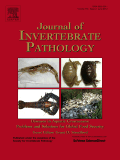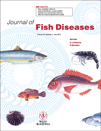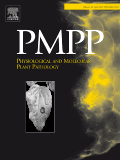
JOURNAL OF INVERTEBRATE PATHOLOGY
Scope & Guideline
Championing Rigorous Research in Invertebrate Pathology
Introduction
Aims and Scopes
- Pathogen Biology and Ecology:
Research in this area explores the biology of various pathogens, including viruses, bacteria, fungi, and protozoa that infect invertebrates. Studies often involve understanding the life cycles, virulence factors, and ecological roles of these pathogens in their respective environments. - Host-Pathogen Interactions:
This scope investigates the interactions between invertebrate hosts and their pathogens, focusing on immune responses, disease processes, and the evolutionary dynamics that shape these relationships. - Disease Dynamics and Control:
Research includes the epidemiology of diseases affecting invertebrates, particularly in aquaculture and agricultural contexts. This area also covers the development and evaluation of biological control strategies, including the use of entomopathogenic fungi and bacteria. - Molecular and Genomic Studies:
The journal publishes studies involving molecular techniques to elucidate the genetic basis of pathogenicity, host resistance, and the interactions at the molecular level between invertebrates and their pathogens. - Environmental and Ecological Impacts:
Research that examines how environmental factors influence pathogen prevalence and virulence in invertebrate populations, as well as the broader ecological consequences of these interactions.
Trending and Emerging
- Microbiome and Pathogen Interactions:
There is a growing interest in understanding the role of the microbiome in influencing pathogen dynamics and host immunity. Research is increasingly focusing on how microbial communities can modulate disease outcomes in invertebrates. - Genomic and Transcriptomic Analyses:
The application of advanced genomic and transcriptomic technologies is on the rise, allowing researchers to dissect the molecular mechanisms of host-pathogen interactions and identify genetic factors that influence disease resistance. - Climate Change Impacts on Pathogen Dynamics:
Studies exploring the effects of climate change on pathogen prevalence and virulence in invertebrates are gaining traction, reflecting a broader concern for how environmental changes may alter disease dynamics in natural and agricultural ecosystems. - Entomopathogenic Fungi and Bacterial Applications:
Research focusing on the use of entomopathogenic fungi and bacteria as biocontrol agents is increasingly popular, driven by the need for sustainable pest management solutions in agriculture and aquaculture. - Cross-Species Pathogen Transmission:
Emerging studies are investigating the potential for pathogens to jump between species, particularly in the context of invasive species or shifting ecosystems, highlighting the importance of understanding pathogen spillover dynamics.
Declining or Waning
- Traditional Pathogen Control Methods:
There has been a noticeable decline in studies focusing on traditional chemical control methods for managing invertebrate diseases, as researchers increasingly favor biological control strategies that are more sustainable and environmentally friendly. - Basic Taxonomic Studies:
Research primarily focused on the taxonomic classification of pathogens has decreased, possibly due to the growing emphasis on functional and ecological studies that connect taxonomy with pathogen behavior and host interactions. - Single-Pathogen Studies:
There is a waning interest in studies examining the effects of single pathogens on invertebrate hosts, with a shift towards more complex investigations involving multi-pathogen interactions and their implications for disease dynamics.
Similar Journals

PHYTOPATHOLOGY
Unveiling insights to protect our crops.PHYTOPATHOLOGY, published by the American Phytopathological Society, is a premier journal dedicated to advancing the science of plant pathology. With an ISSN of 0031-949X and E-ISSN 1943-7684, this journal has been a cornerstone of scholarly communication in the field since its inception in 1946. Ranked in the top quartile (Q1) in both Agronomy and Crop Science and Plant Science for 2023, PHYTOPATHOLOGY has garnered notable recognition with Scopus ranks placing it at #86/516 (83rd percentile) in Plant Science and #69/406 (83rd percentile) in Agronomy and Crop Science. The journal publishes high-quality research articles, reviews, and case studies that explore innovative solutions to plant diseases, thereby supporting agricultural productivity and sustainability. While currently not an open-access journal, it offers vital insights and findings that are invaluable to researchers, professionals, and students aiming to advance their knowledge and contribute to the field of plant sciences.

Phytopathology Research
Pioneering discoveries in plant pathology and molecular biology.Phytopathology Research, published by SPRINGERNATURE, serves as a vital resource in the rapidly evolving fields of biochemistry, genetics, molecular biology, and plant sciences. Since adopting an open access model in 2019, this journal has fostered an inclusive approach to disseminating cutting-edge research and breakthroughs in plant pathology and related disciplines. With an impressive impact factor in the second quartile for Biochemistry, Genetics and Molecular Biology (miscellaneous) and Plant Science, and a robust standing in the Scopus rankings, it attracts high-quality contributions from researchers around the globe. The journal not only supports the academic community's quest for advanced knowledge but also plays a crucial role in addressing global agricultural challenges through innovative research. Positioned in the United Kingdom and operating with a keen focus on enhancing plant health and resistance, Phytopathology Research continues to be an essential platform for both established and emerging scientists in this vital area of study.

JOURNAL OF FISH DISEASES
Advancing aquatic health through innovative research.JOURNAL OF FISH DISEASES, published by WILEY, stands as a preeminent peer-reviewed journal in the fields of aquatic science and veterinary medicine. With its ISSN 0140-7775 and E-ISSN 1365-2761, this journal has been a leading platform for disseminating groundbreaking research since its inception in 1978. Recognized for its excellence, it boasts a Q1 ranking in both Aquatic Science and Veterinary (miscellaneous) categories for 2023, affirming its vital role in advancing knowledge in fish pathology and health management. The journal engages a diverse audience of researchers, professionals, and students committed to tackling fish diseases and enhancing aquaculture practices. Although it does not offer open access, the journal ensures high visibility and accessibility to key research findings that impact aquatic ecosystems and veterinary practices globally. With a commitment to fostering innovation, the JOURNAL OF FISH DISEASES continues to shape the future of aquatic health research well into its convergence through 2024.

Frontiers in Fungal Biology
Exploring the Hidden World of FungiFrontiers in Fungal Biology is an innovative academic journal dedicated to advancing the field of mycology and its interdisciplinary connections, published by FRONTIERS MEDIA SA. With an E-ISSN of 2673-6128, this journal focuses on exploring diverse aspects of fungal biology, including ecological roles, evolutionary processes, and interactions with other organisms. Since its inception in 2020, Frontiers in Fungal Biology has garnered attention within the scientific community, earning a commendable Q2 ranking in both Ecology, Evolution, Behavior and Systematics, and Environmental Science categories in 2023, alongside respectable Q3 rankings in Infectious Diseases and Microbiology. The journal is committed to open access principles, making cutting-edge research freely available to a global audience, promoting knowledge sharing and collaboration. By providing a platform for rigorous research and impactful discussions, Frontiers in Fungal Biology aims to enhance the understanding of fungi and their significant roles in ecosystems, health, and biotechnology, appealing to researchers, professionals, and students alike.

AUSTRALASIAN PLANT PATHOLOGY
Advancing the science of plant health in Australasia.Australasian Plant Pathology, published by Springer, is a leading journal in the field of plant science that focuses on the study of plant diseases and their management across the Australasian region. With an established history since 1978, the journal aims to provide a platform for high-quality research that enhances our understanding of plant pathology, prevention strategies, and sustainable management practices. With an impact factor that reflects its significance in the scientific community and its Q3 quartile ranking in 2023 among plant science journals, it serves as a vital resource for researchers, professionals, and students alike. Although it does not have Open Access options, the journal ensures that its content, which spans a wide spectrum of plant pathology topics, remains accessible to a diverse audience globally. With a commitment to advancing knowledge in this crucial area of study, Australasian Plant Pathology continues to play an essential role in addressing the challenges posed by plant diseases in a changing environment.

Microbial Genomics
Elevating Academic Discourse in GenomicsMicrobial Genomics, an esteemed journal published by the Microbiology Society, is a leading platform dedicated to the rapidly evolving field of microbial genomics. Since its transition to Open Access in 2016, this journal has consistently aimed to promote unprecedented transparency and accessibility in scientific research. Based in the United Kingdom, Microbial Genomics serves a diverse international audience, providing an invaluable resource for researchers, professionals, and students interested in genomics, microbiology, and related fields. With impressive quartile rankings in 2023, including Q1 status in Epidemiology, Genetics, and Microbiology, alongside strong performance in other categories, the journal is positioned at the forefront of academic discourse and innovation. This journal's commitment to excellence is not only reflected in its rigorous peer-review process but also in its dedication to showcasing groundbreaking research that informs current practices and shapes future trends in microbial science. As researchers explore the intricacies of microbial genomes, Microbial Genomics remains an essential resource fostering knowledge and collaboration in the scientific community.

PHYSIOLOGICAL AND MOLECULAR PLANT PATHOLOGY
Bridging molecular insights with physiological understanding.Physiological and Molecular Plant Pathology is a leading journal published by Academic Press Ltd - Elsevier Science Ltd, dedicated to advancing our understanding of plant diseases through the synthesis of physiological and molecular perspectives. With an ISSN of 0885-5765, this esteemed journal has been a cornerstone in the field since its inception in 1986 and continues to publish critical research findings up to 2024. Notably, it holds a strong reputation in Plant Science, ranked Q2, and genetics, ranked Q3, reflecting its impactful contributions to these important areas of study. The journal is recognized within Scopus, achieving a ranking of 151 out of 516 in Plant Science, positioning it within the 70th percentile, making it a vital resource for researchers and students alike. While it is not an open-access journal, the insights provided in each issue are invaluable for those dedicated to understanding the complexities of plant pathology and enhancing agricultural resilience. Researchers, professionals, and students in the field are encouraged to explore and contribute to this pivotal journal, which plays a crucial role in driving innovation and discovery in plant health sciences.

PHYTOPATHOLOGIA MEDITERRANEA
Connecting scholars to the latest in crop science.PHYTOPATHOLOGIA MEDITERRANEA is a premier open access journal published by the Mediterranean Phytopathological Union, dedicated to advancing knowledge in the fields of Agronomy, Crop Science, Horticulture, and Plant Science. With its Q1 status in Agronomy and Crop Science and Horticulture and a strong ranking in Plant Science, this journal is recognized for its significant contribution to research, featuring high-quality studies and reviews that address contemporary challenges in plant health and disease management. As an essential resource for researchers, professionals, and students, PHYTOPATHOLOGIA MEDITERRANEA facilitates the dissemination of cutting-edge research and serves as a critical hub for academic discourse in the Mediterranean region and beyond. Since embracing open access in 2014, the journal has further enhanced its visibility and accessibility, providing a valuable platform for innovative ideas and collaborative research in the vital domain of plant pathology. The journal is indexed in Scopus with impressive rankings, including the 20th percentile in Horticulture, which underscores its esteemed position within the academic community, making it an indispensable source for anyone looking to stay abreast of developments in the field.

mSphere
Championing open access to revolutionary microbial research.mSphere is a leading open-access journal published by the American Society for Microbiology, dedicated to the dynamic fields of Microbiology and Molecular Biology. Since its inception in 2016, mSphere has rapidly established itself as a reputable source of scholarly research, achieving notable impact factors and excellence within the academic community. The journal ranks in the top quartile (Q1) amongst its peers in Microbiology, and Q2 in the field of Molecular Biology, demonstrating its significance and relevance through Scopus rankings—specifically, it holds the #42 spot out of 182 in the Microbiology category and #108 out of 410 in Molecular Biology. With an editorial commitment to advancing the understanding of microbial and molecular sciences, mSphere provides an accessible platform for researchers, professionals, and students alike to disseminate groundbreaking findings. The journal promotes rigorous peer-review and invites innovative contributions aimed at enhancing microbial research mobility and molecular exploration. Accessible openly since 2016, mSphere continues to thrive as an influential publication driving scientific dialogue and discovery in the microbiological sciences.

Pathogens
Innovating Solutions for Tomorrow's Health ChallengesPathogens is a leading open-access journal published by MDPI since 2012, dedicated to advancing the understanding of infectious agents and their interactions with hosts in the fields of immunology, microbiology, and molecular biology. Based in Switzerland, this journal plays a crucial role in disseminating high-quality research that spans from fundamental studies of pathogen biology to the implications for global health and disease management. With a commendable impact factor and prestigious Q2 rankings across multiple categories—including Immunology and Microbiology—Pathogens ensures visibility and accessibility for groundbreaking findings. The journal embraces the ethos of open access, allowing researchers, professionals, and students to access critical research anytime, facilitating a collaborative and innovative academic environment. By bridging the gap between research and application, Pathogens is instrumental in shaping the future of infectious disease research and management.